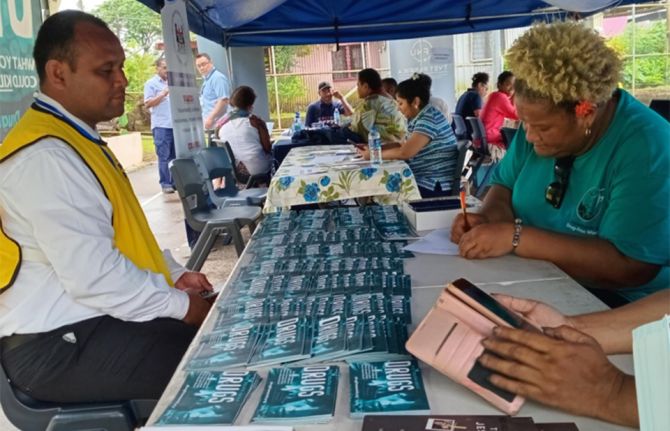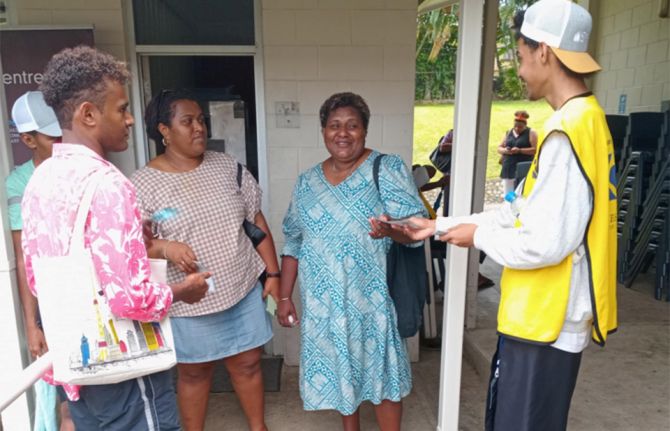



Feature Story
As HIV infections soar due to injecting drug use, harm reduction should be a priority in Fiji
25 July 2025
25 July 2025 25 July 2025This story first appeared in the UNAIDS Global AIDS Update 2025 report.
Kalesi Volatabu, founder of DrugFree World Fiji, breaks the ice at drug awareness sessions by sharing her shocking story.
When she was 13, her parents sent her to relatives in Sydney for what she thought was a vacation. In fact, they expected her to stay there, work and send money back to them in Fiji. She ended up on her own with no passport, no schooling and no care. She spent three years on the streets. Boyfriends abused her. She was raped twice. She attempted suicide three times. By the age of 17, she was a mother.
“Marijuana did nothing for me,” she says. “My drug of choice was meth. I needed to go to the hardest drug to numb the pain I was going through ... to fill the void. When I share this in Fiji today in villages, schools and churches, it gives people the power to say, ‘This is what happened to me.’ It is a healing journey.”
Kalesi leads the one community organization exclusively committed to addressing the drug use fuelling Fiji’s ballooning HIV epidemic.
Since 2014, number of new HIV infections in Fiji has risen by an alarming 10-fold. UNAIDS estimates that in 2014, there were fewer than 500 people living with HIV in Fiji. Just 10 years later, that number was 5900 [4500–8900]. In 2024, only 36% [27–54%] of people living with HIV in Fiji were aware of their HIV status, and only 24% [18–36%] were receiving treatment.
Preliminary data for 2024 from the Ministry of Health show that among people newly diagnosed with HIV who are currently receiving antiretroviral therapy, half contracted HIV through sharing needles.
Responding to the sharp increase in new diagnoses, the Government of Fiji declared an HIV outbreak in January 2025. The HIV Outbreak Response Plan and the previously announced Counter Narcotics and HIV Surge strategies call for the introduction of harm reduction programmes for people who inject drugs. Currently there are none.
Although there is agreement in principle with the introduction of needle–syringe programmes, moving towards implementation has been more challenging. “We still need to raise awareness,” says Kalesi. “It is not just about giving out needles. It is about education. But there are so many myths and misconceptions. We have to educate the leaders first. When the indigenous chiefs call, people will follow. Then there are the churches. Last but not least, the Government.”
Medical Services in the Pacific (MSP) Fiji is prepared to implement a needle–syringe programme. The non-profit-making organization provides a broad range of sexual and reproductive health services. It is already supporting the scale-up of much needed HIV prevention, testing and linkages to care. Beyond its clinics in Labasa, Lautoka and Suva, it deploys an outreach team of clinicians and counsellors to the field. A mobile clinic goes to hotspot areas to provide a package of HIV and noncommunicable disease services in areas with high levels of injecting drug use.
“Since we started providing point-of-care (rapid) screening last year, the numbers have continued to escalate,” says MSP Fiji Country Director, Railala Nakabea. “It is not only in the cities and towns. We are also seeing positive cases in rural communities. Most of the cases we detect are among people who inject drugs.”
MSP Fiji Medical Officer, Kesa Tuidraki, reiterates the importance of harm reduction alongside longer term and more widely accepted plans for the construction of a drug rehabilitation facility. “It is not only HIV,” she says. “We also have increasing hepatitis C infection, which is even more easily spread through sharing injecting equipment. We need to have harm reduction programmes in place as soon as possible. Rehabilitation does not address the immediate public health emergency.” She acknowledges the importance of partnering with an organization of people with lived experience to more effectively serve the community of people who use drugs.
For Kalesi Volatabu, it is critical that stakeholders work together to design a tailored approach. “We definitely need harm minimization strategies, but we have to contextualize the programmes. What would work in the western context will not work in Fiji. You need to speak the language of your audience. It must be driven by the people and owned by the people.”



